- Home
- Chris Wraight
Swords of the Emperor
Swords of the Emperor Read online
Swords of the Emperor
By
Chris Wraight
Product Description
Rebellion consumes the province of Averland and civil war looms, while orcs threaten to sweep out of the mountains and devastate the land. Suspecting the taint of Chaos behind the uprising, the Emperor Karl Franz sends two of his greatest champions to defeat the greenskins, thwart the Dark Gods and restore Imperial rule to Averland.
Table of Contents
INTRODUCTION
MAP
SWORD OF JUSTICE
DEDICATION
CHAPTER ONE
CHAPTER TWO
CHAPTER THREE
CHAPTER FOUR
CHAPTER FIVE
CHAPTER SIX
CHAPTER SEVEN
CHAPTER EIGHT
CHAPTER NINE
CHAPTER TEN
CHAPTER ELEVEN
CHAPTER TWELVE
CHAPTER THIRTEEN
CHAPTER FOURTEEN
CHAPTER FIFTEEN
CHAPTER SIXTEEN
CHAPTER SEVENTEEN
CHAPTER EIGHTEEN
CHAPTER NINETEEN
SWORD OF VENGEANCE
WHAT HAS GONE BEFORE
CHAPTER ONE
CHAPTER TWO
CHAPTER THREE
CHAPTER FOUR
CHAPTER FIVE
CHAPTER SIX
CHAPTER SEVEN
CHAPTER EIGHT
CHAPTER NINE
CHAPTER TEN
CHAPTER ELEVEN
CHAPTER TWELVE
CHAPTER THIRTEEN
CHAPTER FOURTEEN
CHAPTER FIFTEEN
CHAPTER SIXTEEN
CHAPTER SEVENTEEN
CHAPTER EIGHTEEN
CHAPTER NINETEEN
CHAPTER TWENTY
CHAPTER TWENTY-ONE
CHAPTER TWENTY-TWO
EPILOGUE
APPENDIX
FEAST OF HORRORS
DUTY AND HONOUR
ABOUT THE AUTHOR
INTRODUCTION
You remember some books more fondly than others. Some feel like purgatory to write: they emerge only with difficulty, often late, usually after long nights at the keyboard when sleeping more and worrying less would probably have been a better option. Some feel like they come together painlessly, moving smoothly from one scene, to another in a pleasant stream of apt phrases and choice similes.
I remember Sword of Justice as being one of the latter. It was a nice book, one that behaved itself, one that didn’t throw up the kind of problems that make you wonder whether becoming a writer was really such a good idea. It might not actually have been quite that way—all books give you trouble of one sort or another while you’re writing them—but that’s my recollection of it, and I don’t feel inclined to change it.
What’s more, Sword of Justice was, in many ways, my first proper novel set in the Warhammer world. I’d actually written three books beforehand for Black Library, but the first two don’t really count as they were my very first efforts at fiction. The third attempt, Iron Company, is a novel that I’m fond of but it had deliberately limited ambitions. When I was writing it I decided that I needed to immerse myself in the milieu of the Old World—its smells, sounds and general filthiness—and so I poured almost all of my effort into getting the ‘world’ right, and tied all that immersiveness up in a intentionally simple story.
By the time my editor Nick Kyme offered me the chance to pitch for a story involving Ludwig Schwarzhelm, I felt that I was ready to go for broke. By then I wanted to tell a big story that ranged across the whole glorious tapestry of Empire mythology: I wanted it to have sweeping battles, political intrigue, betrayal, dark magic—all the good stuff. I pitched an ambitious proposal, one that involved the Emperor, the Electors of Averland, lots of orcs, Grand Theogonist Volkmar and, most importantly, Schwarzhelm’s great rival and warrior peer Kurt Helborg.
From the beginning, I knew that the story I had in mind would need two books to tell, and hoped Black Library would agree. I also felt that a duology would give the fledgling Warhammer Heroes line an appropriately epic start to its life, one that reflected the stature of the characters involved.
Thankfully, Nick was as enthusiastic about the project’s scope as I was. He and Lindsey Priestley steered both novels from conception to print with their characteristic blend of patience, judicious criticism and priceless encouragement. I’m proud of the results; Sword of Justice and Sword of Vengeance were received well on release, and I think fans appreciated the things we were trying to do with them. It’s now doubly pleasing to see them reissued in an omnibus edition, which puts Schwarzhelm and Helborg between the same covers (as it were) for the first time.
It’s probably worth adding a comment on Warhammer in general here. For a lot of Black Library readers, the fantasy setting can seem like something of a poor relation—it doesn’t get the same attention as its bigger, brasher cousin set in the grim darkness of the far future. In some ways this simply reflects the greater popularity of the accompanying games, but as a writer of both Warhammer and Warhammer 40,000 I’ve never felt that the fantasy books were easier to write, nor that they didn’t offer the same imaginative possibilities as those set in the Imperium of Man. The Empire of the Old World in particular, it seems to me, is just as rich and subtle a universe to tell stories in.
I’ve also always thought that Warhammer can be played straight—that it can be taken as seriously as the backgrounds of other great fantasy worlds. Obviously there’s a lot of fun to be had with the wackier elements of the setting, as the wonderful Gotrek and Felix saga shows, but there’s also a dark, rich basis to the mythos that can sustain (for want of a better word) darker tales.
The Swords books, in some respects, are attempts to do that: to apply scale and austerity to the setting in the way we routinely expect Warhammer 40,000 books to do, and which we also see in the Time of Legends series. Some Warhammer fans, quite properly, prefer the darkly comic tone that’s been a mainstay of the series since the days of Drachenfels, and which finds expression in such brilliantly grotesque figures as Thanquol and Malus Darkblade. The Swords books were written for those who prefer heroic fantasy—who were raised on a diet of Tolkien and Gemmell. It’s a strength of the Warhammer world that such diverse styles of storytelling can be accommodated without anything feeling out of place.
This edition of the books includes a short story, ‘Feast of Horrors’ that was originally written for the 2010 Black Library Live! anthology and which has since been hard to find. It also includes a new story, ‘Duty and Honour’, which was written especially for the omnibus. The first of these is a tale from Schwarzhelm’s past; the second is from Helborg’s.
I’m occasionally asked which of the two heroes I liked writing about best. The answer, although I enjoyed both, is neither. My favourite was and is Pieter Verstohlen, who was the first noncanonical character to be sketched out. One day, should the fates allow, I would like to tell more stories about him. I think, were I ever to write a book with Verstohlen as the lead, that it would be one of the painless ones.
Chris Wraight
February 2012
With love to Hannah—thanks for putting up with all the late nights at the keyboard.
CHAPTER ONE
Andreas Grunwald scrambled backwards up the ridge. The beast was on him. Its musk was sharp in his nostrils. It sensed a kill.
Grunwald gripped his sword more tightly. He could feel his muscles protest. He was tired to the bone. His thick clothes hung from his body, heavy with rain. The water streamed across his face, nearly blinding him.
The beast bellowed, and charged up the slope.
“Sigmar,” whispered Grunwald. I
t was twice his height. Powerful muscles bunched under matted fur. Massive hands swung a crude, notched cleaver. A trooper’s sword still stuck out from its back, right where the man had plunged it, seconds before his death under the hooves.
Grunwald steadied himself, testing the uncertain ground beneath him. A heartbeat too soon, and he’d be lost. Timing was everything.
The beast was on him. Grunwald swung his broadsword. The blade sliced through the air, gore flying from the steel. The cleaver rose to parry. At the last moment, Grunwald shifted his balance, falling to one side, twisting the sword around the cleaver. He dropped to one knee, slipping under the beast’s guard. With all the strength that remained, he plunged his sword-tip upwards. The point was still keen. It punctured flesh, running deep into the beast’s innards.
The creature roared in pain. Its weight was thrown forward. The cleaver fell heavily, but Grunwald stayed firm, both hands on the blade, twisting it further. Thick entrails slipped down the edge, hot against his flesh. For a moment, the beast’s head lolled a few inches from his own. Grunwald could see agony on the horse-like features. So human. So utterly inhuman.
The light extinguished in its whiteless eyes. The beast’s bellows drained to a low growl, and it toppled. Grunwald pulled the sword free as the massive body rolled onto the sodden grass. Panting, his arms throbbing, he stood up and stole a look along the ranks of men on either side.
The line was still intact. All along the ridge, the other Imperial troops held their positions. Eight hundred men, Reikland State Troopers, battled to hold the high ground. They were arranged in long ranks, three deep. The halberdiers and pikemen were in the forefront, desperately trying to repel the beastmen advance from the forest cover at the base of the rise. Behind them, archers and handgunners struggled to maintain a protective barrage. The foul beasts were still trying to force the ascent. There were hundreds of them, surging up the slope. More emerged from the forest canopy every moment. Even though it was the middle of the day, the lowering sky made it look much later.
“Use the damn Helblasters!” Grunwald shouted, staggering back up the bank.
As he went, he felt fingers close over his ankle. A grasp like a steel trap. The beast wasn’t dead.
With a cry of exhausted frustration, Grunwald arced the sword back round. He stabbed down again and again, hacking at the stinking flesh. The monster’s blood, hot and black, coated him. Still he plunged, working the blade like a blacksmith’s hammer. Only when he felt dizzy from the effort did he stop. By the time he was done, the carcass at his feet was little more than a puddle of meat and hair.
Finally, the Helblasters blazed out. From higher up the ridge, a volley of shot flew through the air. There weren’t many of the precious guns left, but their cargo was still deadly. The front ranks of the beastmen stumbled, their fury broken. The creatures were deadly up close, but they had no answer to the artillery.
A second volley rang out, close-packed and lethal. More beasts fell. For a moment, the ragged lines wavered. They were driven by bloodlust, but they could still taste fear. The pikemen on the front lines sensed a change. Some began to creep forward.
“Hold your positions, you dogs!” Grunwald bellowed. All down the line, sergeants shouted the same thing. Staying tight against the ridge-top was their only chance. The guns bought them time, nothing more.
From over the heads of the defending lines, arrows span into the faltering ranks of beasts. Only a few found their mark, and the cattle-like roar of attack started up again. But the Helblasters had a third load to deploy. The barrels were rotated, and the shot rang out again.
That was enough. The beasts disengaged. Huge, shaggy creatures lumbered back to the cover of the trees below. Between them, smaller horrors scampered for cover. They didn’t go far. A few hundred yards away the open ground was swallowed by the forest. They were safe in there. Safe to lick their wounds, regroup, and come back stronger. It wouldn’t be long.
Grunwald limped back up along the ridge. All around him, detachments were re-forming. The harsh cries of the sergeants rang out amid the shuffling lines. Discipline was everything. As soon as the perimeter broke, it was over. For all of them. On the far side of the ridge lay the road, the vital artery they were protecting. The surface was churned and shiny with mud, but it was still more passable than the tangled forest around. It had to stay open. The Cauldron was only a few miles to the north, but every yard of it counted.
As Grunwald gained the higher ground, he saw Ackermann heading towards him. The captain was as covered in blood, sweat and grime as he was. His chainmail was caked in red filth and his beard was twisted and matted. Despite everything, Grunwald let slip a grim smile. The two of them looked like carnival grotesques.
“What d’you think?” growled Ackermann. He was breathing heavily, and he cradled his shield-arm gingerly.
Grunwald took a long look along the lines. The whole regiment was arranged near the summit of the snaking ridge. High up the slope, the pikemen had dug in. In between the extended pikes crouched the halberdiers, supported by a secondary row of state troopers. Further up the ridge, archers and handgunners had been placed, high enough up to have a line of sight over the halberdiers’ heads, but close enough to give the troops cover. Dotted amongst the pistoliers were the few artillery pieces they had left. They’d proved their worth already, and steamed ominously in the rain.
“We can’t take too much more of this,” said Grunwald. “They’ll come again soon.”
Ackermann nodded.
“That they will. We’re losing men, sir. We’ll have to pull back.”
“Where to? There’s nothing behind us but trees all the way back to the Cauldron.”
Ackermann muttered into his beard.
“He’s not coming. This is a damn fool errand. This ridge’ll be our grave.”
Grunwald lost his smile.
“Orders are orders,” he snapped. “Until we get the signal, we hold the position.”
Grunwald’s voice was iron-hard. Ackermann hesitated, then nodded. He looked resigned.
“Yes, sir.”
He headed back towards the front lines. Grunwald watched him go. The man was right. Ackermann was a veteran of twenty years. Few in the ranks lasted that long in the Emperor’s armies. He knew what he was doing. So did Grunwald. The longer they stayed on the ridge, the more beasts would come. The hordes were massing. Sooner or later, their position would become impossible.
Grunwald turned from the ridge and looked back to the empty road.
“Where is he?” Grunwald hissed impatiently.
His thoughts were interrupted. Back down at the foot of the ridge, the bellowing had begun again. The trees shook, and the first beasts burst from cover once more.
Wearily, Grunwald took up his broadsword and headed back to the ranks. The answer would have to wait.
North of the ridge, above the mighty Turgitz Cauldron, the sky was black with piled cloud. Squalls were being driven east by a powerful gale and the western horizon was dark with more. There would be no let up.
Captain Markus Bloch strode up the steep sides of the Bastion, his halberd light in his hands. The streaming rain did nothing to dampen his spirits. He’d been on campaign in Nordland and was used to the ice-cold blasts from the Sea of Claws. There was little the Drakwald could offer in comparison. He let the rivulets run down his grizzled face and under the collar of his jerkin.
He paused for a moment to survey the scene. The Cauldron was a vast, natural depression in the otherwise seamless forest. It was several miles across, huge and stark. Few trees grew within its limits. The earth enclosed by it was dark and choked with stone. The rain had turned it into a thick slurry of mud, but it was still more easily negotiated than the endless twisted leagues of woodland beyond.
The army had chosen to make its stand in the time-honoured place. The Bastion was the name given to the vast outcrop of dark rock that rose up in the very centre of the ancient bowl. It rose in a smooth hump from the f
loor of the Cauldron, half a mile wide and three hundred yards high at the summit. It was like a huge, natural fortress, capable of housing thousands of men and beasts on its back. The incline was shallow enough to ride a horse up on the lower flanks, but soon got steeper. All the way up the flanks of the mighty rock formation, terraces and clefts offered protection from the elements. Centuries of use had worn pathways between them into the hard stone. At the pinnacle, high above the Cauldron, great spikes of rock twisted up into the air like a crown.
The terraces carved into its flanks had been the redoubt of choice for commanders since before the annals of the Empire had been started. The local people, such as there were, said that Sigmar had created it with a celestial plough taken from Ulric while the god of war slept. Bloch was a devout man, but he wasn’t stupid enough to believe stories like that. The Cauldron was just what it was—a place where armies had come to fight for thousands of years. Maybe the blood in the soil was why the trees never grew back.
All around him, the host was preparing for battle. Companies were being marched into position by their captains. They looked like drowned rats, shuffling miserably in the downpour. As always, there was confusion. This was a large army. It took a lot of organising, crammed along the narrow pathways scored into the natural citadel of stone. There were baggage trains and artillery wains, all of which could be accommodated comfortably in the natural gorges of the huge edifice. Several thousand footsoldiers, three companies of cavalry, artillery barrages, irregulars, and mercenaries all crouched in their positions. The bulk of the army were halberdiers and spearmen, augmented with smaller detachments of handgunners and archers. There were more elite soldiers too, such as Baron Ostmer’s own greatswords and a whole company of Knights Panther. Almost all the forces were now deployed on the Bastion, leaving the wide floor of the Cauldron empty. The only exceptions were those who had ridden off to hold the southern approaches in the hope that Helborg would still come. Much as he liked a fight, Bloch didn’t envy them at all.

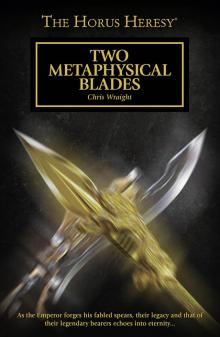 Two Metaphysical Blades
Two Metaphysical Blades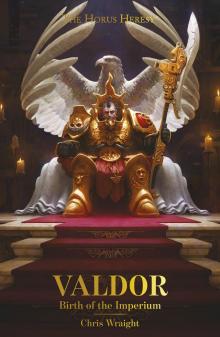 Valdor: Birth of the Imperium
Valdor: Birth of the Imperium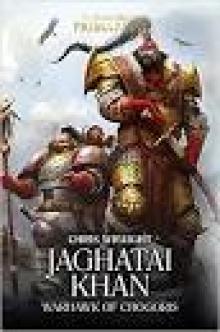 JAGHATAI KHAN WARHAWK OF CHOGORIS
JAGHATAI KHAN WARHAWK OF CHOGORIS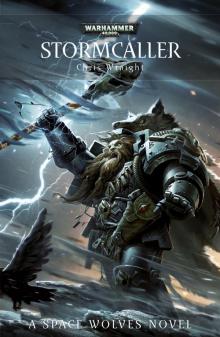 Stormcaller
Stormcaller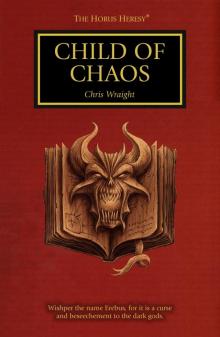 Child of Chaos
Child of Chaos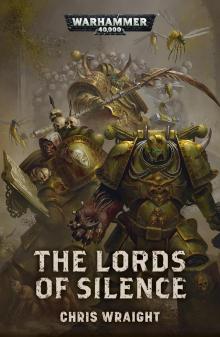 The Lords of Silence
The Lords of Silence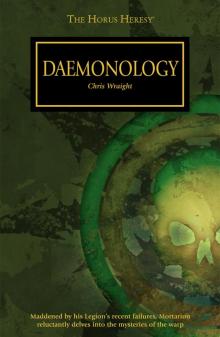 Daemonology
Daemonology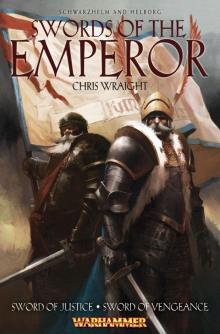 Swords of the Emperor
Swords of the Emperor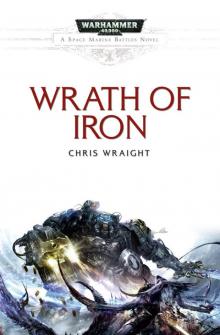 Wrath of Iron
Wrath of Iron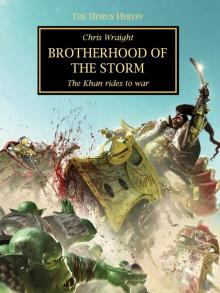 Brothers of the Storm
Brothers of the Storm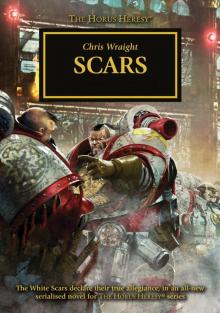 Horus Heresy: Scars
Horus Heresy: Scars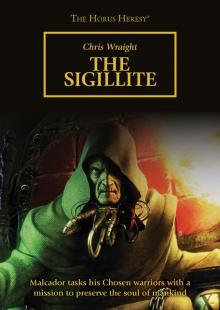 The Sigillite
The Sigillite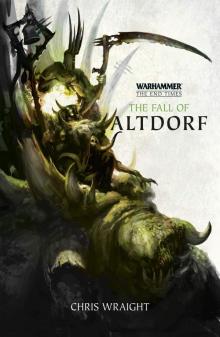 The End Times | The Fall of Altdorf
The End Times | The Fall of Altdorf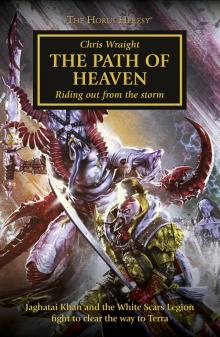 The Path of Heaven
The Path of Heaven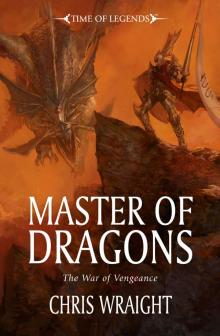 Master of Dragons
Master of Dragons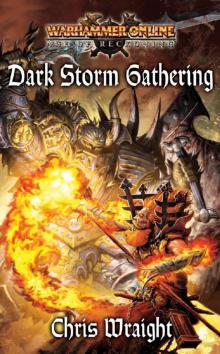 WH-Warhammer Online-Age of Reckoning 02(R)-Dark Storm Gathering
WH-Warhammer Online-Age of Reckoning 02(R)-Dark Storm Gathering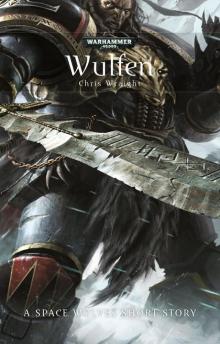 Wulfen
Wulfen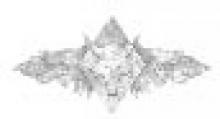 Battle Of The Fang
Battle Of The Fang Onyx
Onyx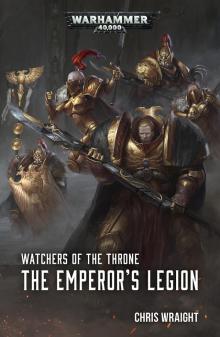 Watchers of the Throne: The Emperor’s Legion
Watchers of the Throne: The Emperor’s Legion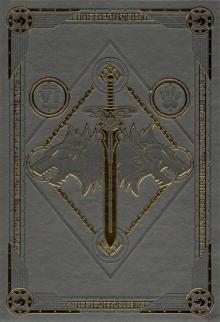 Leman Russ: The Great Wolf
Leman Russ: The Great Wolf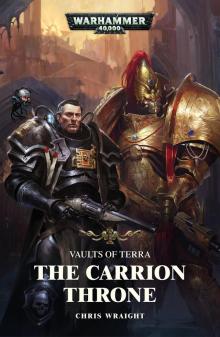 Vaults of Terra: The Carrion Throne
Vaults of Terra: The Carrion Throne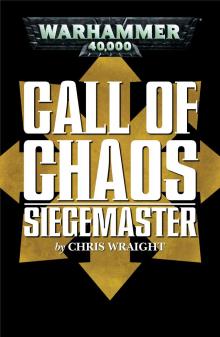 Siegemaster
Siegemaster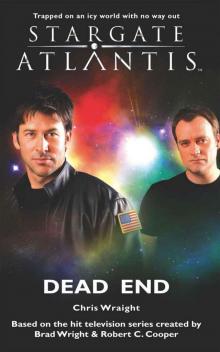 STARGATE ATLANTIS: Dead End
STARGATE ATLANTIS: Dead End Scars
Scars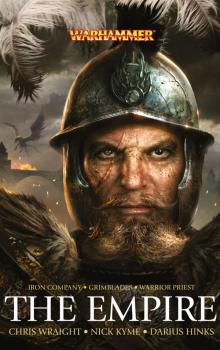 The Empire Omnibus
The Empire Omnibus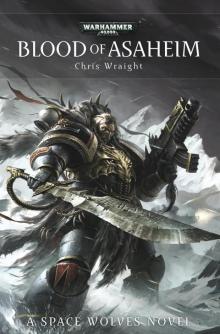 Blood of Asaheim
Blood of Asaheim